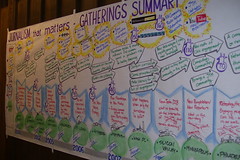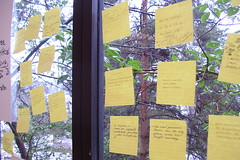Jtm-pnw-world-cafe




WIKI HOME /
CONFERENCE HOME /
PROGRAM SCHEDULE /
VIDEO STREAM /
RJI BLOG /
BLOG AGGREGATION
TWITTER STREAM
PHOTO STREAM /
PHOTO TAG
Contents
JTM-PNW-Thursday evening's world cafes
Here are additional notes by Bill Densmore of Thursday's evening's discussion at the Journalism That Matters-Pacific Northwest convening. More than 230 participants are participating over three days. Now we're going through three rounds of "world cafe."
We've been though three rounds. There is video of these report outs that you can stream from here:
- Kate Gable suggests a few themes. She wrotes for the Chinook Observer. Three themes: Identity and authenticity online -- how and when should that identity be verified in some way? What voice are you speaking in and therefore what are the new norms that need to be created to play in this new place. We are stepping into convergence journalism. McNeil Leherer doing more online; Grist trying to do more investigative. What are the new rules and do you need to follow them.
- Dave Horsey with Hearst Newspapers. Chuck Taylor started drawing a literal map of Seattle. What struck him was how despite all the negative thoughs and worries expressed tonight -- this city of Seattle is pretty well positioned to move ahead in this new ecosystem. There's a balance of media and a media-savvy users. All the way from West Seattle to MSNBC in Redmond, (which runs MSNBC in New York). "We have this national news organization right here." How have they come out of losing the SeattlePI -- "We are better off than some cities would be." There is now SeattlePI.com, which is working; and there is still the Seattle Times, which is one of the better papers in the country. Hearst felt with SeattlePI.com: "This is just a community where that might work." A lot of good stuff going on. "Half of us are out of jobs but everything else is not so bad!"
- Zack Burden. Start by asking about rules and what we value.
- Pam Kilbourne: They saw emerging enthusiasm in the area. "There's been a big crackup but in a sense we are going back to basics with the story." Rebuilding from the ground up. Kids aren't being taught media literacy in school and maybe there should be an initiative to teach that, to get kids involved, because sometime in their the lives they will have to advocate something. There was the emerging theme of cross-platform networks. But not emerging in the discussion: Business models.
- Harold Sinchauto, SAP Business Objects in Germany. He talks about global exchange ... and hyper local. There are new ways of thinking about how you map the territory. And how do we map value? That was raised by someone else. Why is the Dow Jones Industrial Average the only metric of value? Why not have another one?
- Diane Betlith: They looked at trends that were expanding, diminishing and where we had questions. More optimistic than they thought about the world condition and about the promise of more collaboration. Optimism about seeing government embrace the Internet and multimedia for transparency, policy development and connecting with the government in new ways. But also note the digital divided. Less replication of stories and more building of stories through acretion and depth. How does this fit into the market economy? Are we seeing more or less in watchdogs? There may be more eyes and ears out there, but there is worry about the kind of reporting through relationships build over years of trust. What will happen to the disclosures and scrutiny that developed out of those kinds of relationships?
- Michelle Ferrier: Not from the region she can't notice lots. She wanted to know if the folks in the room are representative of the landscape?
- Peter Rinhear: Doing a startup which involves journalism. There are lots of reasons why people are pessimistic. As a youth, he and a friend drove 12,000 miles to interview newspaper editors and asked them, are you doing enough to let in the voices of your community. They thought they were doing a good job. Now there are lots of reasons to feel anxious, but there are going to be a lot of new things coming long -- its an exciting time.
- Charlie Hamilton: An ex media guy too. Discussions tonight more positive than he had expected also. You are in global competition as a journalist now. But there are tools to build your own brand and your own job. We are hearing that journalism will survive and good journalism will prosper. The technology will change, it will be more on-demand and something you can do yourself. But the people who do the best are those who are adaptable and to things nobody has ever done before. "That's what we are hearing." A lot of people will find it frustration.
Should we be writing from love?
- Monica at SeattlePI.COM. Two years ago she realized she was jealous of neighborhood bloggers like Tracy because the reason why so many people would rather read about Ballard in MyBallard.com because MyBallard was free to write about things from the perspective of the success of the Ballard neighborhood. She says they right from a position of love. They race to the scene. "That's what it is -- it's love. These blogs emerged from people who did it for love.... at SeattlePI -- have we been doing that? Are publications are hundreds of years old. Do we remember our initial passions that got us into it? Let's show that we love Seattle. It seems obvious now."
- Lion Kimbro: Our region, our landscape. Talked about racial landscapes for neighborhood news blogs. Talked about language barriers, minority newspapers that have coexisted. Talked about regional immigrant cultures, races, peoples all the way to world news where the important things are going on. He was part of a conversation about roles. Talked about region's of perspective.
Stepping out of the economic box
- Karen Weill. She came because she is worried about the balance between the new media landscape and trust. How do we do transparency and accountability in order to build trust. It is something you have to build up over time. She went back to what Chris had said about being comfortable with your discomfort. People have challenged us to step out of the box. What are the assumptions when we put the map together. "I want to challenge you to step out of the economic box." The war is an untouchable topic. How do you have an economic model that is going to be sustainable. Nobody is willing to talk about the big c -- capitalism. And I'm challenge you to do so.
- Andrew Sorkin. New media ecosysem is a dialog. That's the direct media is going -- people getting what they want when they want it. It's now about listening. That relates to what Chris was saying -- listening to how we feel so people can get in touch with their values and their passion. If anyone values their passion and mission, that provides the answer. Leading with that example causes more people to follow their own path.
- Margo Gordon: Started out with the idea that journalists have lost their swagger and that came out of words like the chaotic, transition, fragmentation. Words switched to reinvigoration, networking, convergence journalism and things that require a lot fo collaboration and honesty. In her previous live, she used to talk a lot about how you can go about questioning the institutional assumptions. That's what this whole group is going through now, those that controlled how everybody worked. What are the things to have important to have out on the table.
- Sanjay Bhatt: A theme sounded earlier and discussed at his table was the permanent fixture of a collaborative ethos in the culture now. In formal ways big media is partnering with neighborhood bloggers and the bloggers forming add networks. It is in smaller ways in the beliefs and attitudes of reporters -- far more of a sense of collaboration. There is still a competitive spirit but more of a sense of collaboration. Seattle Times sends links to other websites and sharing ideas. Reporters are now commenting and are finally entering a relationship with readers.
- Danielle from Vancouver, B.C.: The regional landscape is the Internet, for her. She is from a flipped,opposite viewpoint as to a regional landscape being physical.
Closing reflections by Holman/Silha
Stephen Silha thanks folks for coming for the evening and asks Peggy Holman to explain why the full Journalism That Matters lasts for four days. Holman says when we are working with something open-ended, we continue to process. We live in a culture that looks for answers, but JTM brings questions. "You will find that tomorrow, you are processing overnight, we are not looking for closure, you will be in a completely difference space in the morning."
Stephen: So tomorrow is possibilities days -- design ideas. Saturday is how do we make those projects work. Sunday is coaching circles and project planning teams.
Holman: Tonight we are working with one question. Tomorrow there will be many questions.
Tomorrow: Breakfast at 8:15 a.m. and 9 a.m. program start.
QUICKLINKS
PROGRAM SCHEDULE / VIDEO STREAMING / JTM-RJI BLOG / FOLLOW TWITTER COMMENTARY WIKI HOME / JTM-PNW HOME PAGE